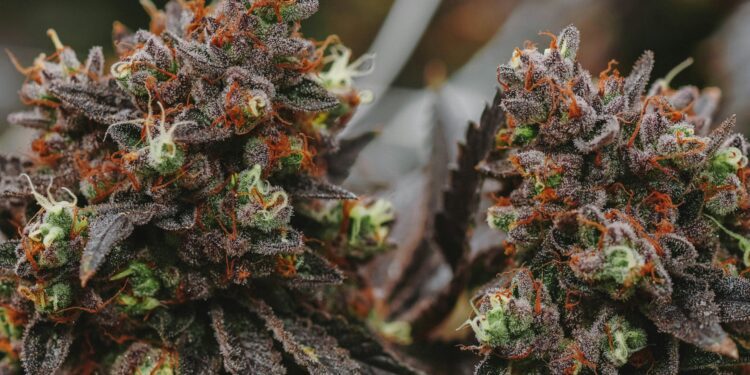Eventually, most adults reach a point where we realize we are out of touch with those much younger than us.
Perhaps it is a pop culture reference that sparks the realization. For me, this moment happened when I was in my late 20s and working with adolescents in school settings to help them quit smoking. When other drugs would occasionally come up, I didn’t understand some of the slang terms they used for these drugs. Many people may have that feeling now when the topic of cannabis comes up – especially in its different and newer forms.
As a professor of psychology, I focus my research on substance use in adolescents and young adults. A major change during my time in research is the legalization and explosion of cannabis availability across the U.S.
There are arguments for and against increasing legalization of cannabis for adult use in the U.S., but expanded access to legal cannabis also may have unintended consequences for adolescents. These consequences are compounded by the increasing potency of some cannabis products.
A shifting landscape
I use the word “cannabis” since it refers to the plant from which the drugs are derived. It also serves as a catch-all term for any substance with chemical compounds from cannabis plants and addresses concerns that the word marijuana has some long-standing racist overtones.
Cannabis now comes in a larger variety of forms than it used to. When most people over 40 think of cannabis, they imagine its dried form for smoking. This cannabis was not particularly strong: The average THC concentration of cannabis seized by the Drug Enforcement Agency in 1995 was 4%, while it was roughly 15% in 2021.
In addition to the smoked form, some might remember an edible form, often baked into a dessert like a brownie, or hashish, which is derived from more potent parts of the cannabis plant.
Today there are many different cannabis concentrates that have high levels of THC, typically ranging from 40% to 70%, and more than 80% in some cases, depending on the method of extraction.
These include oils that can be vaporized by vape or dab pens, waxier substances and even powders.
How cannabis derivatives interact with the brain
THC and cannabidiol, or CBD, are the most common chemicals in cannabis. Each one interacts with the brain in different ways, producing different perceived effects.
CBD does not produce the same “high” that THC does, and cannabidiol may have benefits as a medication for severe epilepsy, as well as other potential but as yet unproven medical uses. The differences between THC and CBD come from how they interact with cannabinoid receptors – the proteins onto which these drugs attach – in the brain and body.
However, CBD can also make people sleepy, alter mood in unintended ways and cause stomach upset. Never use a CBD product without consulting a physician.
The changing nature of cannabis products
THC is the chemical most strongly associated with the high from cannabis. By increasing the amount of THC, concentrated products can increase blood levels of THC rapidly and more strongly than nonconcentrates such as traditional smoked cannabis.
Cannabis concentrates also come in many different forms that range from waxy or creamy to hard and brittle. They are made in a variety of ways that may require dry ice, water or flammable solvents such as butane.
The myriad names for cannabis concentrates can be confusing. Concentrate names include “budder,” which refers to a yellowish paste like frosting; “shatter” is made similarly to budder but comes in a thin, brittle and translucent form; there’s also “wax” or “crumble,” which confusingly is not waxy but is more like a powdery or grainy substance; and “keef” or “kief,” which is powdery in nature and derived from the most potent parts of the cannabis plant. It is similar to hashish.
The names change regularly and can vary by guide or from person to person. It is best to ask what a term means from an open and curious place than to act as if you know all the terminology.
Many concentrates are vaporized and inhaled. Vaporizing is different than smoking, as vaporizing heats the concentrate until it becomes a gas, which is inhaled. Smoking involves burning the compound to produce an inhaled gas.
Many who vaporize concentrates call it “dabbing.” This refers to the dab of concentrate to heat, vaporize and inhale.
Another way to vaporize cannabis concentrates is to use a vape pen. Vape pens are sometimes also called dab pens, depending on the local terms.
Cannabis use and adolescents
One of the reasons why young people are drawn to these sorts of products is that vaping or dabbing the concentrated form makes it easier to hide cannabis use. Vaping cannabis does not create the typical smell associated with weed.
A 2021 systematic review found that past-year cannabis vaping nearly doubled from 2017 to 2020 in adolescents – jumping from 7.2% to 13.2%. A more recent study in five northeastern U.S. states found that 12.8% of adolescents vaped cannabis in the past 30 days, a more narrow time frame that suggests potential increases in use. In addition, a 2020 study found that one-third of adolescents who vape do so with cannabis concentrates.
Cannabis use by adolescents is scary because it can alter the way their brains develop. Research shows that the brains of adolescents who use cannabis are less primed to change in response to new experiences, which is a key part of adolescent development. Adolescents who use cannabis are also more likely to experience symptoms of schizophrenia, struggle more in school and engage in other risky behaviors.
The risks of cannabis use are even greater with concentrates because of the high levels of THC. This is true for both adolescents and adults, with greater risk for symptoms of schizophrenia such as hallucinations and delusions, mental health symptoms and more severe cannabis use.
The best analogy is with another drug – alcohol. Most people know that a 12-ounce beer is much less potent than 12 ounces of vodka. Cannabis in smoked form is closer to the beer, while a concentrate is more like the vodka. Neither is safe for an adolescent, but one is even more dangerous.
These dangers make early conversations with kids about cannabis and cannabis concentrates critically important. Research consistently shows that expressing disapproval of drug use makes adolescents less likely to start drug use.
Start these conversations early – ideally before middle school. You can find some helpful online resources to guide the conversation.
While these conversations can be uncomfortable, and you can look like the out-of-touch adult, they can be a major step toward preventing adolescents from using cannabis and other drugs.
This article is part of Legal cannabis turns 10, a series examining the impact of a decade of recreational cannabis use.
You may be interested in:
Ty Schepis, Professor of Psychology, Texas State University
This article is republished from The Conversation under a Creative Commons license. Read the original article.















